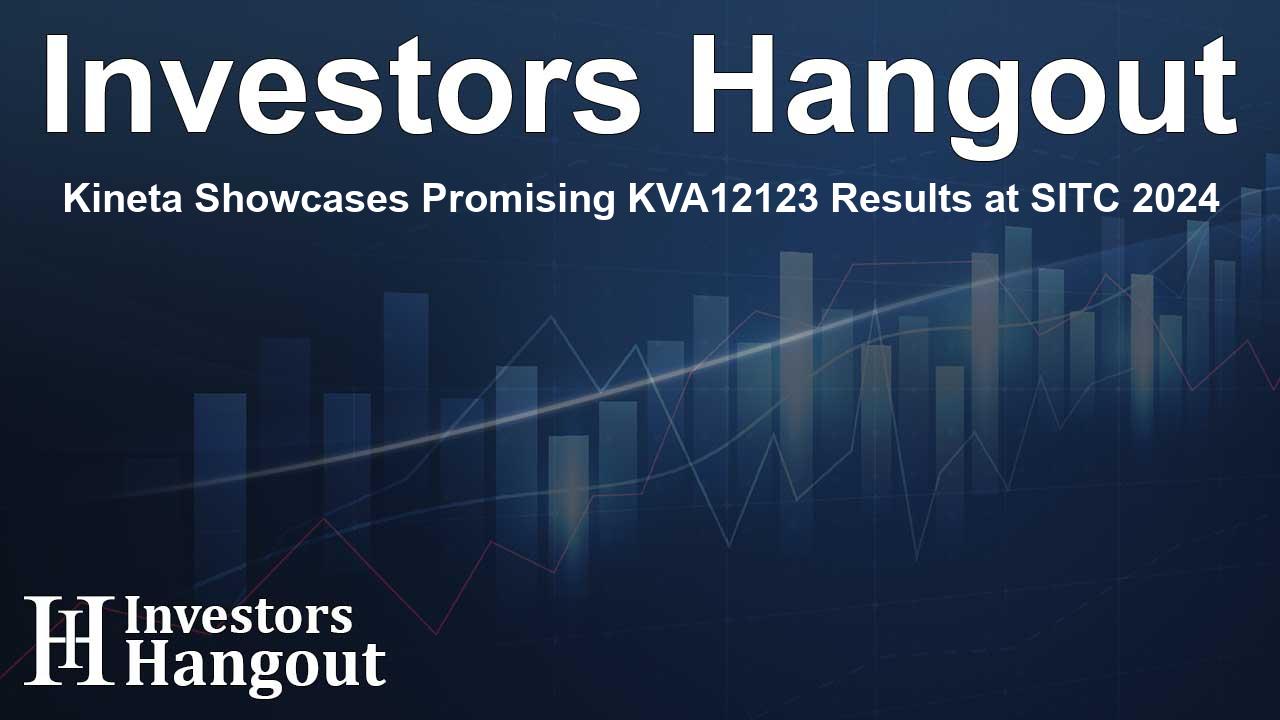Kineta Showcases Promising KVA12123 Results at SITC 2024

Promising Clinical Results from Kineta's KVA12123 Study
At the recent Society for Immunotherapy of Cancer (SITC), Kineta, Inc. (OTC Markets: KANT) shared exciting new findings regarding its VISTA-101 clinical trial. This trial is examining KVA12123, a monoclonal antibody designed to target VISTA, in patients battling advanced solid tumors.
Enrollment and Trial Progress
The VISTA-101 study has made significant strides, with all participants enrolled in the monotherapy arm and expectations to complete enrollment for the combination therapy arm shortly. This advancement is crucial for patients seeking innovative cancer treatments.
Monotherapy Insights
The monotherapy with KVA12123 has seen encouraging responses. Among 24 patients across six different dosing levels, 19 participants underwent follow-up scans. Notably, 13 of those patients showed stable disease, indicating that KVA12123 exhibits potential as a standalone therapy. An impressive case involved a patient with non-small cell lung cancer, who achieved 60 weeks of stable disease despite failing multiple prior therapies, including immunotherapy.
Combination Therapy Findings
In the combination treatment cohort, where KVA12123 is paired with Merck’s anti-PD-1 agent, KEYTRUDA, initial results also informatively demonstrate clinical effectiveness. Reports indicate at least one confirmed partial response and beneficial outcomes in renal cell carcinoma patients previously treated with checkpoint inhibitors. The overall safety of KVA12123 is commendable, as no dose-limiting toxicities were observed in any patients throughout the trial.
Insights from the Presentation
Dr. Jason Henry from the Sarah Cannon Research Institute presented the data, highlighting that no dose-limiting toxicities were reported at any dosage level within either study cohort. Kineta's KVA12123 showcases a clean safety profile with minimal adverse events, paving the way for further trials and dosages.
Expert Opinions on Clinical Data
Dr. Henry expressed excitement about the results, suggesting that KVA12123 holds promise as a new option for patients encountering challenging cancers. Thierry Guillaudeux, the Chief Scientific Officer of Kineta, reinforced this sentiment by noting the potential clinical benefits observed in patients, along with a favorable safety profile.
Strategic Collaboration with TuHURA
Kineta has entered into a partnership with TuHURA Biosciences, aimed at enhancing its VISTA-101 trial. The agreement involves financial investment, supporting the reopening of patient enrollment and further collaboration on clinical studies for advanced solid tumor cancers.
KVA12123: A Novel Immunotherapy Approach
KVA12123 represents a key development in Kineta’s pipeline, known for its innovative approach to targeting VISTA, a negative immune checkpoint linked to reduced T cell function in tumors. This treatment could effectively switch off the tumor's ability to suppress immune responses, thus fostering a robust anti-tumor reaction.
The potential of KVA12123 expands across multiple cancer types, including non-small cell lung cancer, colorectal cancer, renal cell carcinoma, and others. Given that traditional therapies targeting VISTA face challenges regarding effectiveness or side effects, KVA12123 has shown promise without provoking cytokine release syndrome, making it a compelling candidate in the realm of oncology.
Conclusion: The Future of Cancer Treatment with Kineta
The advancements discussed at SITC indicate a hopeful future for Kineta and its research into KVA12123. As more robust data emerges from ongoing clinical trials, patients and healthcare providers gain potential new avenues for tackling solid tumors effectively. Kineta remains committed to evolving cancer treatment landscapes with innovative approaches that address the underlying resistance mechanisms.
Frequently Asked Questions
What is KVA12123?
KVA12123 is an anti-VISTA monoclonal antibody being explored in clinical trials for its effectiveness in treating advanced solid tumors.
Where was the study presented?
The latest results were presented at the Society for Immunotherapy of Cancer (SITC) conference.
What were the results of the study?
Patients receiving KVA12123 showed stable disease and promising results, with minimal adverse effects reported.
How does KVA12123 work?
KVA12123 works by blocking VISTA, enhancing the immune system's ability to attack cancer cells.
What is Kineta's mission?
Kineta aims to develop innovative immunotherapies that transform cancer treatment and improve patient outcomes.
About Investors Hangout
Investors Hangout is a leading online stock forum for financial discussion and learning, offering a wide range of free tools and resources. It draws in traders of all levels, who exchange market knowledge, investigate trading tactics, and keep an eye on industry developments in real time. Featuring financial articles, stock message boards, quotes, charts, company profiles, and live news updates. Through cooperative learning and a wealth of informational resources, it helps users from novices creating their first portfolios to experts honing their techniques. Join Investors Hangout today: https://investorshangout.com/
Disclaimer: The content of this article is solely for general informational purposes only; it does not represent legal, financial, or investment advice. Investors Hangout does not offer financial advice; the author is not a licensed financial advisor. Consult a qualified advisor before making any financial or investment decisions based on this article. The author's interpretation of publicly available data shapes the opinions presented here; as a result, they should not be taken as advice to purchase, sell, or hold any securities mentioned or any other investments. The author does not guarantee the accuracy, completeness, or timeliness of any material, providing it "as is." Information and market conditions may change; past performance is not indicative of future outcomes. If any of the material offered here is inaccurate, please contact us for corrections.